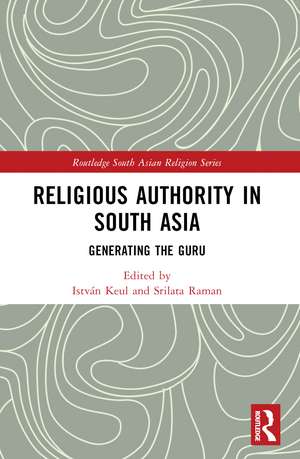Religious Authority in South Asia: Generating the Guru: Routledge South Asian Religion Series
Editat de István Keul, Srilata Ramanen Limba Engleză Paperback – 26 aug 2024
Experts in the field present reflections on historically specific contexts in which a guru comes into being, becomes part of a community, is venerated, challenged or repudiated, generates a new canon, remains unique with no clear succession or establishes a succession in which charisma is routinized. The guru emerges and is sustained and routinized from the nexus of guruship, narratives, performances and community. The contributors to the book examine this nexus at specific historical moments with all their elements of change and contingency.
The book will be of interest to scholars in the field of South Asian studies, the study of religions and cultural studies.
| Toate formatele și edițiile | Preț | Express |
|---|---|---|
| Paperback (1) | 393.31 lei 43-57 zile | |
| Taylor & Francis – 26 aug 2024 | 393.31 lei 43-57 zile | |
| Hardback (1) | 1008.80 lei 43-57 zile | |
| Taylor & Francis – 30 sep 2022 | 1008.80 lei 43-57 zile |
Din seria Routledge South Asian Religion Series
-
 Preț: 310.22 lei
Preț: 310.22 lei -
 Preț: 326.46 lei
Preț: 326.46 lei -
 Preț: 309.50 lei
Preț: 309.50 lei -
 Preț: 392.93 lei
Preț: 392.93 lei -
 Preț: 488.33 lei
Preț: 488.33 lei -
 Preț: 486.17 lei
Preț: 486.17 lei - 25%
 Preț: 823.08 lei
Preț: 823.08 lei -
 Preț: 410.46 lei
Preț: 410.46 lei -
 Preț: 484.47 lei
Preț: 484.47 lei -
 Preț: 389.66 lei
Preț: 389.66 lei -
 Preț: 388.26 lei
Preț: 388.26 lei -
 Preț: 385.41 lei
Preț: 385.41 lei -
 Preț: 382.91 lei
Preț: 382.91 lei - 17%
 Preț: 271.61 lei
Preț: 271.61 lei - 17%
 Preț: 245.19 lei
Preț: 245.19 lei - 17%
 Preț: 244.65 lei
Preț: 244.65 lei -
 Preț: 326.49 lei
Preț: 326.49 lei -
 Preț: 389.66 lei
Preț: 389.66 lei - 18%
 Preț: 996.83 lei
Preț: 996.83 lei -
 Preț: 383.30 lei
Preț: 383.30 lei - 18%
 Preț: 997.90 lei
Preț: 997.90 lei -
 Preț: 415.67 lei
Preț: 415.67 lei -
 Preț: 383.89 lei
Preț: 383.89 lei -
 Preț: 385.80 lei
Preț: 385.80 lei
Preț: 393.31 lei
Nou
Puncte Express: 590
Preț estimativ în valută:
75.27€ • 78.10$ • 62.91£
75.27€ • 78.10$ • 62.91£
Carte tipărită la comandă
Livrare economică 17-31 martie
Preluare comenzi: 021 569.72.76
Specificații
ISBN-13: 9781032259314
ISBN-10: 1032259310
Pagini: 292
Ilustrații: 2
Dimensiuni: 156 x 234 x 16 mm
Greutate: 0.54 kg
Ediția:1
Editura: Taylor & Francis
Colecția Routledge
Seria Routledge South Asian Religion Series
Locul publicării:Oxford, United Kingdom
ISBN-10: 1032259310
Pagini: 292
Ilustrații: 2
Dimensiuni: 156 x 234 x 16 mm
Greutate: 0.54 kg
Ediția:1
Editura: Taylor & Francis
Colecția Routledge
Seria Routledge South Asian Religion Series
Locul publicării:Oxford, United Kingdom
Public țintă
Academic and PostgraduateCuprins
1 Introduction: Contextualizing gurus in South Asia 2 How the guru lost his power: Public anxieties of tantric knowledge in the Sanskrit vetāla tales 3 The guru function in the emergence of Marathi literature in thirteenth-century India 4 Guru Dādū in the perception of his direct disciples 5 Canonization of bhakti gurus: A missing link between Jai Singh II and Hariścandra 6 The emergence of the social in the service of the Guru 7 Between sagacity and scandal: Celibacy, sexuality, and a guru in nineteenth-century Punjab 8 The occluded guru, or the guru as gardener: C. Jinarajadasa’s theosophical universe 9 Inversions of Kim: The Victorian childhood of J. Krishnamurti 10 The Vaidika’s limits: Candraśekharendra Sarasvatī Svāmī (1894-1994) and Tamil brahmin guruship 11 The fiction of ecumenical universalism: Where gurus do not matter 12 Between the letter and the spirit: Gandhi’s orbit 13 Guru sex: Charisma, proxemic desire, and the haptic logics of the guru-disciple relationship 14 Manufacturing charisma in the metropolis 15 Narrating the spiritualized life 16 The gurus of a post-colonial education: An autobiographical note 17 Selected publications by Vasudha Dalmia
Notă biografică
István Keul is Professor in the Study of Religions at the University of Bergen, Norway. His areas of research include various aspects of the history and sociology of South Asian religions. He is the author of a monograph on the Hindu deity Hanuman and has edited volumes on tantra, Yoginis, Banaras and consecration rituals, and recently "Spaces of Religion in Urban South Asia" (2021, Routledge).
Srilata Raman is Professor of Hinduism in the Department for the Study of Religion, University of Toronto, Canada. Her monographs include Self-Surrender (Prapatti) to God in Śrīvaiṣṇavism (2007, Routledge) and The Transformation of Tamil Religion: Ramalinga Swamigal and Modern Dravidian Sainthood (2022, Routledge). In addition, she has co-authored two edited volumes and published numerous articles on Tamil religion with a special focus on Śrīvaiṣṇavism and the Tamil Śaivasiddhānta.□
Srilata Raman is Professor of Hinduism in the Department for the Study of Religion, University of Toronto, Canada. Her monographs include Self-Surrender (Prapatti) to God in Śrīvaiṣṇavism (2007, Routledge) and The Transformation of Tamil Religion: Ramalinga Swamigal and Modern Dravidian Sainthood (2022, Routledge). In addition, she has co-authored two edited volumes and published numerous articles on Tamil religion with a special focus on Śrīvaiṣṇavism and the Tamil Śaivasiddhānta.□
Descriere
This book focuses on genealogies of religious authority in South Asia, examining the figure of the guru in narrative texts, polemical tracts, hagiographies, histories, in contemporary devotional communities, New Age spiritual movements and global guru organizations..
